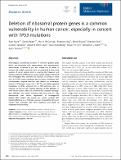| dc.contributor.author | Ajore, Ram | |
| dc.contributor.author | Raiser, David | |
| dc.contributor.author | McConkey, Marie | |
| dc.contributor.author | Jöud, Magnus | |
| dc.contributor.author | Boidol, Bernd | |
| dc.contributor.author | Mar, Brenton | |
| dc.contributor.author | Saksena, Gordon | |
| dc.contributor.author | Weinstock, David M | |
| dc.contributor.author | Armstrong, Scott | |
| dc.contributor.author | Ellis, Steven R | |
| dc.contributor.author | Ebert, Benjamin L | |
| dc.contributor.author | Nilsson, Bjorn | |
| dc.date.accessioned | 2017-06-15T14:44:21Z | |
| dc.date.available | 2017-06-15T14:44:21Z | |
| dc.date.issued | 2017-03 | |
| dc.date.submitted | 2017-01 | |
| dc.identifier.issn | 1757-4676 | |
| dc.identifier.issn | 1757-4684 | |
| dc.identifier.uri | http://hdl.handle.net/1721.1/109887 | |
| dc.description.abstract | Heterozygous inactivating mutations in ribosomal protein genes (RPGs) are associated with hematopoietic and developmental abnormalities, activation of p53, and altered risk of cancer in humans and model organisms. Here we performed a large‐scale analysis of cancer genome data to examine the frequency and selective pressure of RPG lesions across human cancers. We found that hemizygous RPG deletions are common, occurring in about 43% of 10,744 cancer specimens and cell lines. Consistent with p53‐dependent negative selection, such lesions are underrepresented in TP53‐intact tumors (P ≪ 10⁻¹⁰), and shRNA‐mediated knockdown of RPGs activated p53 in TP53‐wild‐type cells. In contrast, we did not see negative selection of RPG deletions in TP53‐mutant tumors. RPGs are conserved with respect to homozygous deletions, and shRNA screening data from 174 cell lines demonstrate that further suppression of hemizygously deleted RPGs inhibits cell growth. Our results establish RPG haploinsufficiency as a strikingly common vulnerability of human cancers that associates with TP53 mutations and could be targetable therapeutically. | en_US |
| dc.description.sponsorship | United States. National Institutes of Health (R01 HL082945) | en_US |
| dc.description.sponsorship | United States. National Institutes of Health (P01 CA108631) | en_US |
| dc.language.iso | en_US | |
| dc.publisher | Wiley Blackwell | en_US |
| dc.relation.isversionof | http://dx.doi.org/10.15252/emmm.201606660 | en_US |
| dc.rights | Creative Commons Attribution 4.0 International License | en_US |
| dc.rights.uri | http://creativecommons.org/licenses/by/4.0/ | en_US |
| dc.source | European Molecular Biology Organization (EMBO) | en_US |
| dc.title | Deletion of ribosomal protein genes is a common vulnerability in human cancer, especially in concert with | en_US |
| dc.type | Article | en_US |
| dc.identifier.citation | Ajore, Ram; Raiser, David; McConkey, Marie; J?ud, Magnus; Boidol, Bernd; Mar, Brenton; Saksena, Gordon et al. “Deletion of Ribosomal Protein Genes Is a Common Vulnerability in Human Cancer, Especially in Concert with TP53 Mutations.” EMBO Molecular Medicine 9, no. 4 (March 2017): 498–507 © 2017 The Authors | en_US |
| dc.contributor.department | Broad Institute of MIT and Harvard | en_US |
| dc.contributor.mitauthor | Ebert, Benjamin L | |
| dc.contributor.mitauthor | Nilsson, Bjorn | |
| dc.relation.journal | EMBO Molecular Medicine | en_US |
| dc.eprint.version | Final published version | en_US |
| dc.type.uri | http://purl.org/eprint/type/JournalArticle | en_US |
| eprint.status | http://purl.org/eprint/status/PeerReviewed | en_US |
| dspace.orderedauthors | Ajore, Ram; Raiser, David; McConkey, Marie; Joud, Magnus; Boidol, Bernd; Mar, Brenton; Saksena, Gordon; Weinstock, David M; Armstrong, Scott; Ellis, Steven R; Ebert, Benjamin L; Nilsson, Bjorn | en_US |
| dspace.embargo.terms | N | en_US |
| mit.license | PUBLISHER_CC | en_US |
